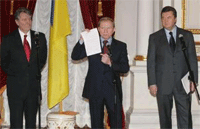Putin makes Ukrainian crisis Russia's internal matter
Ukraine is splitting into east and west on account of the language problem

Vladimir Putin stated during the talks with Leonid Kuchma that Russia supported the efforts of the Ukrainian President to prevent a possible split of the country.
”We are deeply concerned about the current trend that may break the country into two. We support your efforts aimed at strengthening the integrity of the state. We are worried about it and we are not being indifferent about what is happening in Ukraine,” Putin said. 
The Russian president also touched upon the issue of the Russian language status in Ukraine. “According to the official population census data, there are 17 percent of ethnic Russians in Ukraine. The number is a lot larger in fact. It is a completely Russian-speaking country. We do not divide it into East and West,” Putin said. The president pointed out that at least every other Ukrainian family had close personal links with Russia.
Putin assured Kuchma that Russia would always stay with Ukraine: “I would like to assure you that Russia will always be with Ukraine. Russia will always support and assist Ukraine in all efforts taken to stabilize the situation in the country. Ukraine is a joint and independent state for us. You were right when you said that we were living in one and the same country for so many years. That is why we do not separate Ukraine into northern, southern or western areas,” Putin was quoted as saying.
Few people believed just several months ago that Ukraine would find itself on the edge of a split. The events that happened in the country during the latest two weeks have virtually destroyed the Ukraine that existed prior to the second voting round of November 21st, as President Leonid Kuchma put it.
Western regions of Ukraine were the first to push their local interests forward: they dismissed president-appointed governors and established concurrent governing agencies. Eastern territories followed the example several days later: eastern Ukrainian regions started talking about their own autonomies, whereas the Lugansk region decided to close borders on Ukraine.
None of the feuding parties in the poll crisis obviously wanted such a situation to occur: a possible break-up of the nation would inevitably lead to an economic crisis, which would be disastrous to everyone.
The forthcoming collapse, however, brought up the idea of power distribution between the president and the parliament (to the benefit of the latter). “One should urgently conduct a political reform. The government will resign as a result and the new government will be established,” Leonid Kuchma stated at a session with government members on December 2nd.
The presidential election divided Ukraine into two on the language principle. The majority of the electorate in Russian-speaking regions voted for governmental candidate Viktor Yanukovich, while the Ukrainian-speaking regions voted for the opposition leader Viktor Yushchenko. The rapid process of disintegration proves that there were good reasons for it: south-eastern territories of Ukraine have always been Russia-oriented, whereas such a direction is absolutely unacceptable for others. That is why the current crisis in the country has not been caused with the issue of presidential powers.
Those people, who live in Western Ukraine, think of themselves as the true Ukrainians. They are certain that the whole country must speak the Ukrainian language. On the other hand, the vast majority of eastern Ukrainians do not rejoice at the idea of turning down their native Russian language.
Each part of the Ukrainian society sees its own way for Ukraine to become a single nation. The true Ukrainians believe that one should take a slight effort and restrict the use of the Russian language in national mass media and in the educational field. Proponents of the Russian speech in the country suggest a compromise, when both Russian and Ukrainian could have the status of official Ukrainian languages.
Inspirers and political sponsors of the forced “Ukrainization” live abroad – they could care less about the stability in Ukraine. Their objective is to create a powerful platform to stand up against Russia – they do not need a half-Russian Ukraine. It could also serve as an explanation to the opposition's refusal to accept compromising solutions.
Even if the political reform takes place and the parliament becomes the central governing agency, the wish of the two language parts of Ukraine to speak their mother tongues will not change. The aspiration of certain Western politicians to make Ukraine become cannon fodder for Russia will not change either. The political reform will probably help reduce the tension of the crisis, although it will never be capable of removing the prime cause of it. A “public mind reform” would be much more efficient in terms of setting the conflict in a civilized way.
Roman Melnikov
Subscribe to Pravda.Ru Telegram channel, Facebook, RSS!


